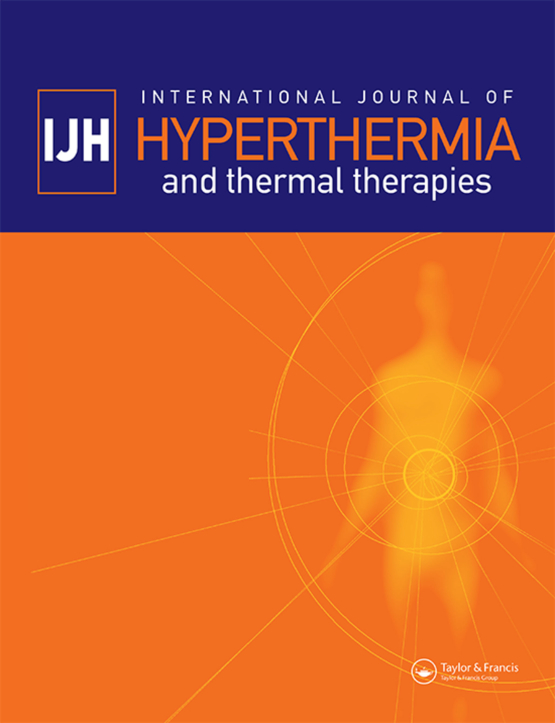Submit a Manuscript to the Journal
International Journal of Hyperthermia
For an Article Collection on
Heat-Sensitive Liposomal Drug Delivery: A Game Changer in Hyperthermic Oncology
Manuscript deadline


Article collection guest advisor(s)
Dr. Hans Crezee,
University of Amsterdam
Heat-Sensitive Liposomal Drug Delivery: A Game Changer in Hyperthermic Oncology
International Journal of Hyperthermia is pleased to announce a new Article Collection dedicated to the transformative role that liposomal drug delivery has had in hyperthermic oncology.
This Collection, reviewed by the Editor-In-Chief Dr. Hans Crezee, is part of the new Game Changer series of Article Collections, focusing on breakthrough therapies, drugs, and technologies that have significantly altered the standard of care, leading to game-changing improvements in patient outcomes.
Heat-sensitive liposomal drug delivery systems (HSLDDS) leverage thermosensitive liposomes to enhance the precision and efficacy of oncological treatments. These liposomes are engineered to release their encapsulated therapeutic agents in response to elevated temperatures, typically induced by localized hyperthermia. The liposomes' thermosensitivity is often achieved through the incorporation of thermosensitive polymers or lipids that undergo phase transitions at specific temperatures, facilitating the controlled release of the drug. This targeted release mechanism ensures that the drug is delivered directly to the tumor site, minimizing systemic toxicity and maximizing therapeutic efficacy.
In oncology, HSLDDS can be combined with hyperthermia treatments to synergistically inhibit tumor growth. Traditional chemotherapy is often unable to specifically target tumor cells and can lead to systemic toxicity, leading to adverse side effects and suboptimal therapeutic outcomes. Studies have shown that combining HSLDDS with hyperthermia improves drug bioavailability and tumor targeting, leading to improved response rates and fewer adverse effects. The ability to precisely control drug release and target tumor cells while sparing healthy tissues make HSLDDS a promising innovation in cancer therapy.
International Journal of Hyperthermia welcomes manuscripts on a range of topics in the area of heat-sensitive liposomal drug delivery systems in hyperthermic oncology. Please see our Instructions for Authors page for information about formatting and article types. Potential subtopics include but are not limited to:
- Mechanisms of Thermosensitivity: Exploring the molecular and biophysical principles behind the thermosensitive behavior of liposomes.
- Hyperthermia Techniques: Detailed analysis of different hyperthermia methods used to trigger drug release, such as radiofrequency, microwave, and ultrasound-induced hyperthermia.
- Drug Encapsulation and Release Kinetics: Investigating the efficiency of drug encapsulation within liposomes and the kinetics of drug release upon heating.
- Clinical Trials and Efficacy: Reporting on clinical trials that assess the efficacy, safety, and therapeutic outcomes of HSLDDS in cancer patients.
- Combination Therapies: Examining the effects of combining HSLDDS with other treatments like chemotherapy, radiotherapy, and immunotherapy. Papers might consider the use of iron containing nanoparticles and gold nanoparticles to induce hyperthermia using radiofrequency and lasers.
- Nanocarrier Design and Optimization: Discussing the design, synthesis, and optimization of liposomal nanocarriers for improved drug delivery and targeting.
- Pharmacokinetics and Biodistribution: Studying the pharmacokinetics, biodistribution, and bioavailability of drugs delivered via HSLDDS.
- Tumor Microenvironment: Analyzing how the tumor microenvironment influences the effectiveness of HSLDDS and strategies to overcome related challenges.
Submitting authors will be eligible for a discount on associated Article Publishing Charges (APC). Please contact Ashley Ambros with any queries and discount codes regarding this Article Collection.
Papers published within the Game Changer series will benefit from additional promotional activities across Taylor and Francis, increasing the discoverability and visibility of your research.
Manuscripts submitted to this Article Collection will undergo a full peer-review. Please review the journal scope prior to submitting a manuscript as it will be rejected if it does not fall within the scope of the journal.
The deadline for submitting manuscripts is 1 June 2026.
Please submityour manuscript on our website, selecting “Heat-Sensitive Liposomal Drug Delivery: A Game Changer in Hyperthermic Oncology" from the drop-down menu for consideration in this Article Collection. Please include any discount codes before you submit as these codes will not be applied retrospectively.

Benefits of publishing open access within Taylor & Francis
Global marketing and publicity, ensuring your research reaches the people you want it to.
Article Collections bring together the latest research on hot topics from influential researchers across the globe.
Rigorous peer review for every open access article.
Rapid online publication allowing you to share your work quickly.
Submission Instructions
All manuscripts submitted to this Article Collection will undergo desk assessment and peer-review as part of our standard editorial process. Guest Advisors for this collection will not be involved in peer-reviewing manuscripts unless they are an existing member of the Editorial Board. Please review the journal Aims and Scope and author submission instructions prior to submitting a manuscript.
